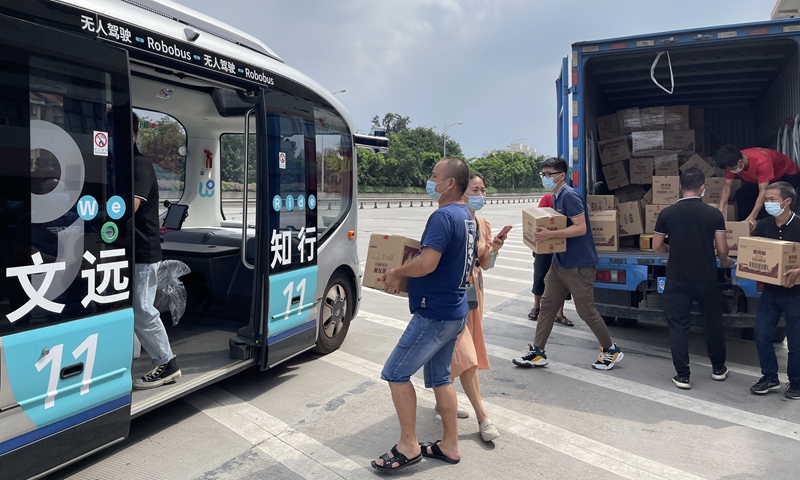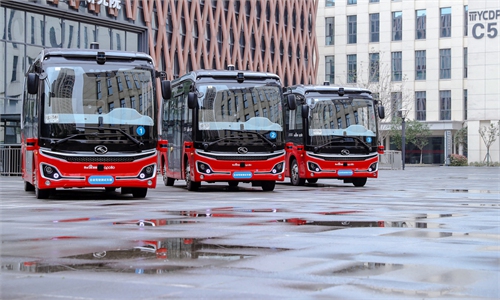
Volunteers in Guangzhou, Guangdong Province, helps load anti-virus material on WeRide's autonomous minibus on June 5. Photo: Courtesy of WeRide
Chinese autonomous vehicle makers are participating in the fight against the spread of the coronavirus in Guangzhou, South China's Guangdong Province, by deploying a variety of autonomous cars to deliver anti-epidemic material and transport medical workers to areas under quarantine or lockdown.
Pony.ai, a Chinese autonomous driving start-up, also known as the domestic answer to Google-backed self-driving start-up Waymo, dispatched 14 vehicles to Guangzhou's Liwan district on Saturday.
As of Sunday, Pony.ai had sent out its first batch of autonomous vehicles with 15 passenger vehicles and two heavy trucks to Nansha district, and another 51 autonomous vehicles - including 45 passenger cars and six heavy trucks - are going through the reporting process, with the upcoming focus being shifted to Nansha district.
Another Chinese autonomous car maker WeRide joined the effort on Friday as the first autonomous vehicle firm to help deliver anti-virus material.
WeRide has set up collecting sites to help deliver material and daily necessities for residents under quarantine. Six collecting sites had been established as of Saturday with nearly 9 tons of daily necessities being transported on the same day. A total of 279 consignments of material were completed on Sunday.
In addition, Baidu Apollo also arranged five types of autonomous vehicles - logistics delivery vehicles, food delivery vehicles, minibuses, medium-sized buses, and shared autonomous vehicles - to help transport anti-epidemic material, China Business Network reported on Sunday.
Guangzhou has been adopting high technologies in every possible way to curb the spread of the virus. As it aims to speed up its citywide nucleic acid testing, a variety of high technologies are being used to accelerate the testing process, according to local media reports.
Mobile testing vehicles have been playing a significant role in the battle, saving transport time for nucleic acid samples and greatly improving the efficiency of nucleic acid detection, the Xinhua News Agency reported on June 1.
It cited the example of Sun Yat-Sen Memorial Hospital, which has the capacity to test 3,000 to 5,000 people a day, with results being released within 150 minutes. That saves at least 60-90 minutes compared with sending the samples to a lab.
Four groups of temporary air-inflated mobile COVID-19 test labs, also known as "falcon labs," were also set up at Guangzhou Gymnasium and put into operation on June 3, which are able to test 120,000 samples a day, China News Service reported on Friday.
China has broadly leveraged information technology to fight the virus, compared with other countries, Wang Peng, an assistant professor at the Gaoling School of Artificial Intelligence at the Renmin University of China, told the Global Times on Monday. Wang cited the online green health code system, the common use of infrared body temperature measurement across the country, and doctors diagnosing and treating COVID-19 patients remotely.
The US and European countries have been innovating technologies such as fast testing and medication, Wang said.
Looking forward, the future application scenarios of high-tech in anti-virus practices may be more aimed at improving efficiency, such as inventing faster nucleic acid detection methods, Wang added.
A total of 94 infections were reported in Guangzhou during the latest resurgence as of Saturday, including 80 confirmed cases and 14 asymptomatic infections.
Global Times

